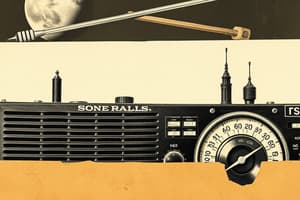Podcast
Questions and Answers
On which HF/MF bands is a General license holder granted all amateur frequency privileges?
On which HF/MF bands is a General license holder granted all amateur frequency privileges?
- Any band below 30 MHz
- 80 meters, 40 meters, and 20 meters
- 160 meters, 60 meters, 30 meters, 17 meters, 12 meters, and 10 meters (correct)
- 10 meters, 15 meters, and 6 meters
On which of the following bands is phone operation prohibited?
On which of the following bands is phone operation prohibited?
30 meters
On which of the following bands is image transmission prohibited?
On which of the following bands is image transmission prohibited?
30 meters
Which of the following amateur bands is restricted to communication only on specific channels, rather than frequency ranges?
Which of the following amateur bands is restricted to communication only on specific channels, rather than frequency ranges?
Which of the following frequencies is in the General class portion of the 40-meter band (in ITU Region 2)?
Which of the following frequencies is in the General class portion of the 40-meter band (in ITU Region 2)?
Which of the following frequencies is within the General class portion of the 75-meter phone band?
Which of the following frequencies is within the General class portion of the 75-meter phone band?
Which of the following frequencies is within the General class portion of the 20-meter band?
Which of the following frequencies is within the General class portion of the 20-meter band?
Which of the following frequencies is within the General class portion of the 80-meter band?
Which of the following frequencies is within the General class portion of the 80-meter band?
Which of the following frequencies is within the General class portion of the 15-meter band?
Which of the following frequencies is within the General class portion of the 15-meter band?
Which of the following frequencies is available to a control operator holding a General class license?
Which of the following frequencies is available to a control operator holding a General class license?
When General class licensees are not permitted to use the entire voice portion of a band, which portion of the voice segment is generally available to them?
When General class licensees are not permitted to use the entire voice portion of a band, which portion of the voice segment is generally available to them?
Which of the following applies when the FCC rules designate the Amateur Service as a secondary user on a band?
Which of the following applies when the FCC rules designate the Amateur Service as a secondary user on a band?
What is the approximate action if, when operating on either the 30-meter or 60-meter bands, a station in the primary service interferes with your contact?
What is the approximate action if, when operating on either the 30-meter or 60-meter bands, a station in the primary service interferes with your contact?
Which of the following may apply in areas under FCC jurisdiction outside of ITU Region 2?
Which of the following may apply in areas under FCC jurisdiction outside of ITU Region 2?
What portion of the 10-meter band is available for repeater use?
What portion of the 10-meter band is available for repeater use?
What is the maximum height above ground to which an antenna structure may be erected without requiring notification to the FAA and registration with the FCC, provided it is not at or near a public use airport?
What is the maximum height above ground to which an antenna structure may be erected without requiring notification to the FAA and registration with the FCC, provided it is not at or near a public use airport?
With which of the following conditions must beacon stations comply?
With which of the following conditions must beacon stations comply?
Which of the following is a purpose of a beacon station as identified in the FCC rules?
Which of the following is a purpose of a beacon station as identified in the FCC rules?
Which of the following transmissions is permitted?
Which of the following transmissions is permitted?
Which of the following one-way transmissions are permitted?
Which of the following one-way transmissions are permitted?
Under what conditions are state and local governments permitted to regulate Amateur Radio antenna structures?
Under what conditions are state and local governments permitted to regulate Amateur Radio antenna structures?
What are the restrictions of the use of abbreviations or procedural signals in the Amateur Service?
What are the restrictions of the use of abbreviations or procedural signals in the Amateur Service?
When choosing a transmitting frequency, what should you do to comply with good amateur practice?
When choosing a transmitting frequency, what should you do to comply with good amateur practice?
On what HF frequencies are automatically controlled beacons permitted?
On what HF frequencies are automatically controlled beacons permitted?
What is the power limit for beacon stations?
What is the power limit for beacon stations?
Who or what determines 'good engineering and good amateur practice,' as applied to the operation of an amateur station in all respects not covered by the Part 97 rules?
Who or what determines 'good engineering and good amateur practice,' as applied to the operation of an amateur station in all respects not covered by the Part 97 rules?
Flashcards are hidden until you start studying
Study Notes
General License Privileges
- General license holders have all amateur frequency privileges on 160m, 60m, 30m, 17m, 12m, and 10m bands.
- Phone operation is prohibited on the 30m band.
- Image transmission is also prohibited on the 30m band.
Band Specific Regulations
- The 60m band is restricted to communication on specific channels instead of frequency ranges.
- General class frequency for 40m band in ITU Region 2 is 7.250 MHz.
- General class frequency for 75m phone band is 3900 kHz.
- General class frequency for 20m band is 14305 kHz.
- General class frequency for 80m band is 3560 kHz.
- General class frequency for 15m band is 21300 kHz.
Frequency Use and Permits
- General licensees can use all frequencies available to them under their license.
- When unable to use the entire voice portion of a band, General class licensees typically access the upper frequency end.
- Amateur stations designated as secondary users must avoid causing harmful interference to primary users on a band.
- If interference occurs on 30m or 60m bands from primary services, it's advisable to move or cease transmission.
Regulations and Requirements
- Frequency allocations outside ITU Region 2 may differ from those in Region 2.
- Repeater use on the 10m band is allowed only above 29.5 MHz.
- Antenna structures under 200 feet do not require FAA notification or FCC registration if not near public use airports.
- Beacon stations must only transmit one signal in the same band from a specific location.
Beacon Station Purposes and Regulations
- A recognized purpose of beacon stations includes monitoring propagation and reception.
- Occasional retransmission of weather and propagation information from U.S. government stations is allowed.
- Transmissions aimed at learning the International Morse code are permissible.
- State and local governments can regulate amateur radio antennas as long as they accommodate reasonable Amateur Service communications minimally.
Communication Practices
- Abbreviations or procedural signals can be used in the Amateur Service as long as they do not obscure message meaning.
- Good amateur practice while selecting transmitting frequencies includes following comprehensive guidelines.
- Automatically controlled beacons may operate within frequencies of 28.20 MHz to 21.09 MHz.
- Power limit for beacon stations is capped at 100 watts PEP output.
- The FCC defines "good engineering and good amateur practice" in operations not explicitly covered by Part 97 rules.
Studying That Suits You
Use AI to generate personalized quizzes and flashcards to suit your learning preferences.




